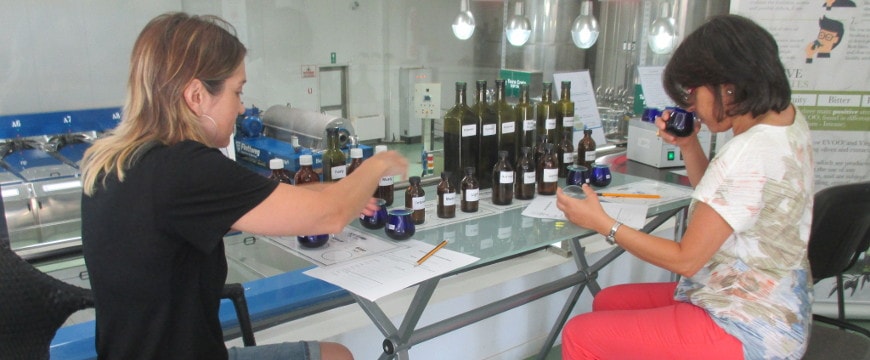Terra Creta in Kolymvari, Crete, Greece offers a 4 hour seminar on olive oil quality and organoleptic evaluation (olive oil tasting) for visitors, chefs, and other related professionals. The seminar is led by international olive oil competition judge Eleftheria Germanaki and olive oil expert Emmanouil Karpadakis. Shorter tours and talks are also available.
With their Advanced Olive Oil Tasting & Culture Pro Seminar, Terra Creta provides lessons for both beginners from around the world and more experienced food professionals such as chefs. Beginners can find out the basics about olive oil types, harvesting, production, selection, storage, tasting, and Cretan olive oil culture, while more advanced visitors such as a prominent Cretan chef can move on to topics like food pairings. (Tourists can also sign up for the informative hour-long Olive Oil Experience tour, which concludes with a brief olive oil tasting, or a two-hour Basic Olive Oil Tasting Pro Seminar.)
Starting with an overview of the harvesting and olive oil production process during a tour of Terra Creta’s mill with the company’s exporter and marketing manager, Emmanouil Karpadakis, the beginners’ seminar also presents background information on olive oil quality, consumption, and exports in major olive oil producing nations, with a focus on Greece and Crete.
Participants learn about the health benefits of olive oil and the Cretan diet (now more often referred to as the Mediterranean diet, a more general term). They perceive the danger of not knowing what good olive oil is: consumers may miss the health benefits that accompany the bitterness and pungency of many extra virgin olive oils.
Newcomers to the olive oil world are told that olive oil is the only food in the world with legislation about its taste. They hear about the role of the International Olive Council in describing the organoleptic method and determining olive oil categories and the terms used to describe it, as well as the laws and regulations regarding olive oil production and labelling.
Participants find out about olive oil quality criteria and the importance of not only the chemical analysis, but also the organoleptic (or sensory) evaluation, which focuses on the olive oil’s positive or negative aroma and taste (light, medium, or intense). They are informed that olive oil sensory evaluation results affect both the classification and labeling of an olive oil, and also the market price. Definitions of extra virgin, virgin, and lampante olive oil (which is unfit for consumption) are discussed using the criteria of the International Olive Council.
Introducing the organoleptic method, Eleftheria Germanaki and Emmanouil Karpadakis explain the use of blue tasting glasses to hide the olive oil’s color, since color is generally not relevant to the evaluation of an olive oil’s quality (except in the case of experts with extensive knowledge about a specific variety). They advise tasters to use apples and water to cleanse the palate between tastings.
Seminar participants begin learning to detect aromas and flavors in olive oils, then try to compare them with what they know and finally describe them. They hear that the positive characteristics of olive oil are fruitiness, bitterness, and pungency. On the other hand, the wide variety of negative characteristics (including rancidity, muddiness, and mustiness) is important because each one suggests the cause of the problem, the step where an error was made that could be avoided in the future.
Beginning tasters initially focus on distinguishing the difference between extra virgin olive oil, virgin olive oil, and lampante, getting an idea of the different defects and intensities of defects, while acknowledging that people don’t all have the same level of detection ability. They notice bitterness spread around their tongue and feel pungency at the back of the throat, where this peppery characteristic may cause a cough.
After a quiz on the new tasters’ ability to distinguish a few types of positive characteristics and defects, the seminar concludes by debunking some common myths about olive oil and discussing the best ways to select and store it. Then the group heads outside for a taste of Cretan snacks and hospitality with raki under the olive trees. Finally, participants received a Certificate of Attendance, although the most important take-away is a deeper appreciation of the differences among olive oils and the ways to evaluate and select them.
See Book Your Tour on the top menu (at the right) on Terra Creta's website to reserve a spot.
All businesses, organizations, and competitions involved with Greek olive oil, the Mediterranean diet, and/or agrotourism or food tourism in Greece, as well as others interested in supporting Greeks working in these sectors, are invited to consider the advertising and sponsorship opportunities on the Greek Liquid Gold: Authentic Extra Virgin Olive Oil website. The only wide-ranging English-language site focused on news and information from the Greek olive oil world, it has helped companies reach consumers in more than 215 countries around the globe.


